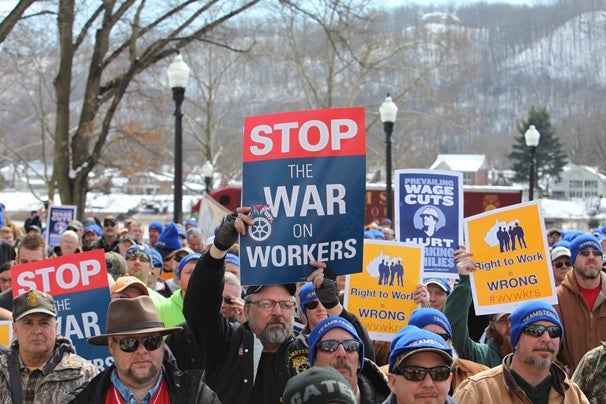News
A New Fight in the War on Workers

Working Americans stood up to the political establishment in 2016 and demanded that the resources of the country and efforts of the government be devoted to restoring the manufacturing base that provided generations of Americans with good paying jobs that propelled them into the middle class.
They wanted those jobs brought back from foreign countries and they wanted to stop today’s employers from continuing to close American factories, moving them to countries where they could find employees who would work for less and demand fewer benefits. Behind the narrative is the fact that most of the good paying jobs that corporations made disappear were union jobs, covered by union contracts guaranteeing middle class wages, medical and pension benefits.
But as a new Congress took its place on Capitol Hill this year, it became quickly apparent that those in charge are listening to the big business interests that bankrolled their election campaigns, including many of the businesses that closed their factories in the United States and left for foreign shores. Nowhere is that clearer than the Republican’s roll out of right-to-work (RTW) legislation that would further decimate good wages nationwide.
Under current law, each state has the right to decide whether to adopt right-to-work laws for private sector employees in industries other than rail and airlines. Now the oft-proclaimed proponents of limited federal authority want to take that right away from the states and authorize the federal government to impose a law that will eliminate the right of workers to participate in democratic organization that provide them a say in their workplaces.
The destructive anti-worker bill recently introduced by Reps. Joe Wilson (R-S.C.) and Steve King (R-Iowa) would amend the National Labor Relations Act and Railway Labor Act to prohibit workers and their elected bargaining representatives from negotiating contracts to protect and improve their wages and conditions of employment and spread the cost of that representation among all of the workers that reap the benefits.
Once RTW laws are enacted, lower wages and fewer rights on the job are sure to follow. As the Economic Policy Institute noted, wages are 3.1 percent lower in RTW states for both union and non-union workers, even after calculating differences in cost of living, demographics and the local labor market. That would become the reality nationwide as workers would now have less bargaining power.
This legislation does nothing to create jobs, grow the middle class or improve the lives of workers. It’s shameful that some members of Congress have chosen to prioritize big business interests over the demands of their constituents. The Teamsters Union is committed to improving the lives of working people by fighting against RTW.
For more information, visit www.teamster.org.